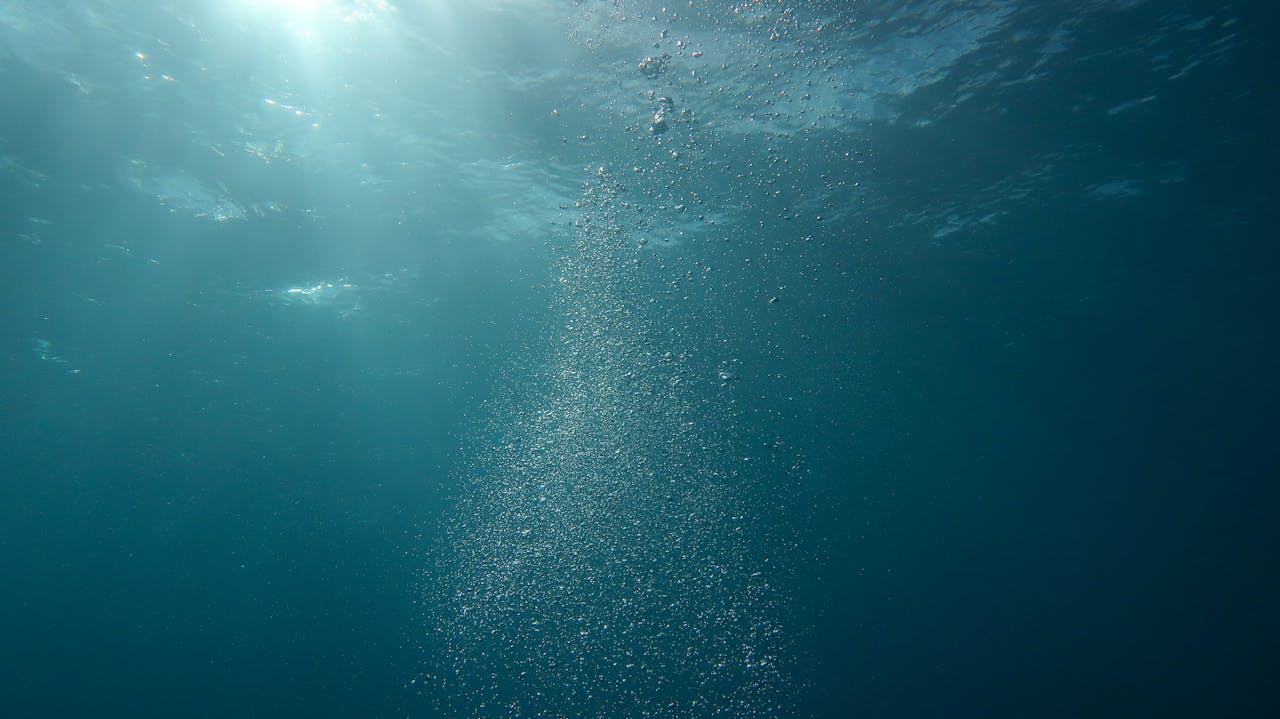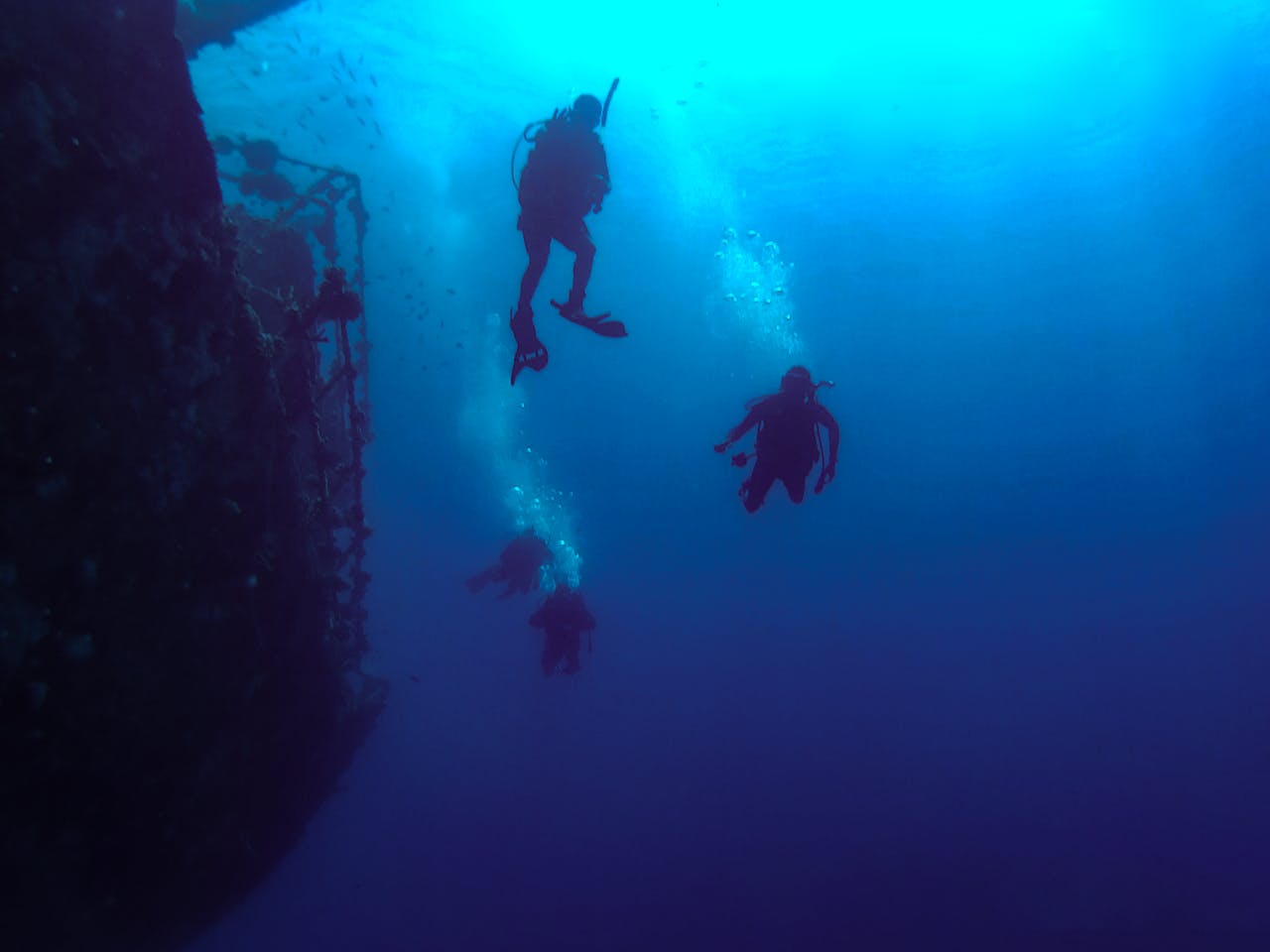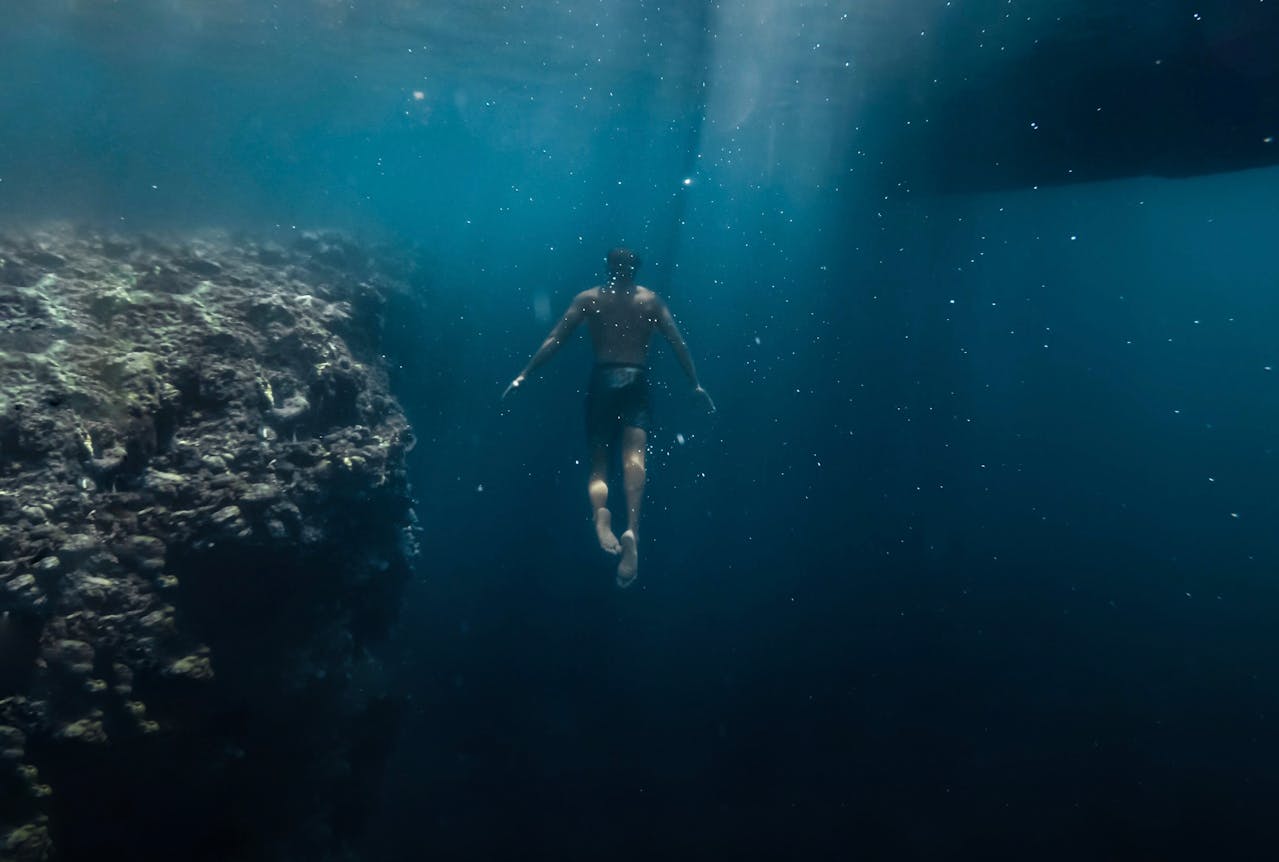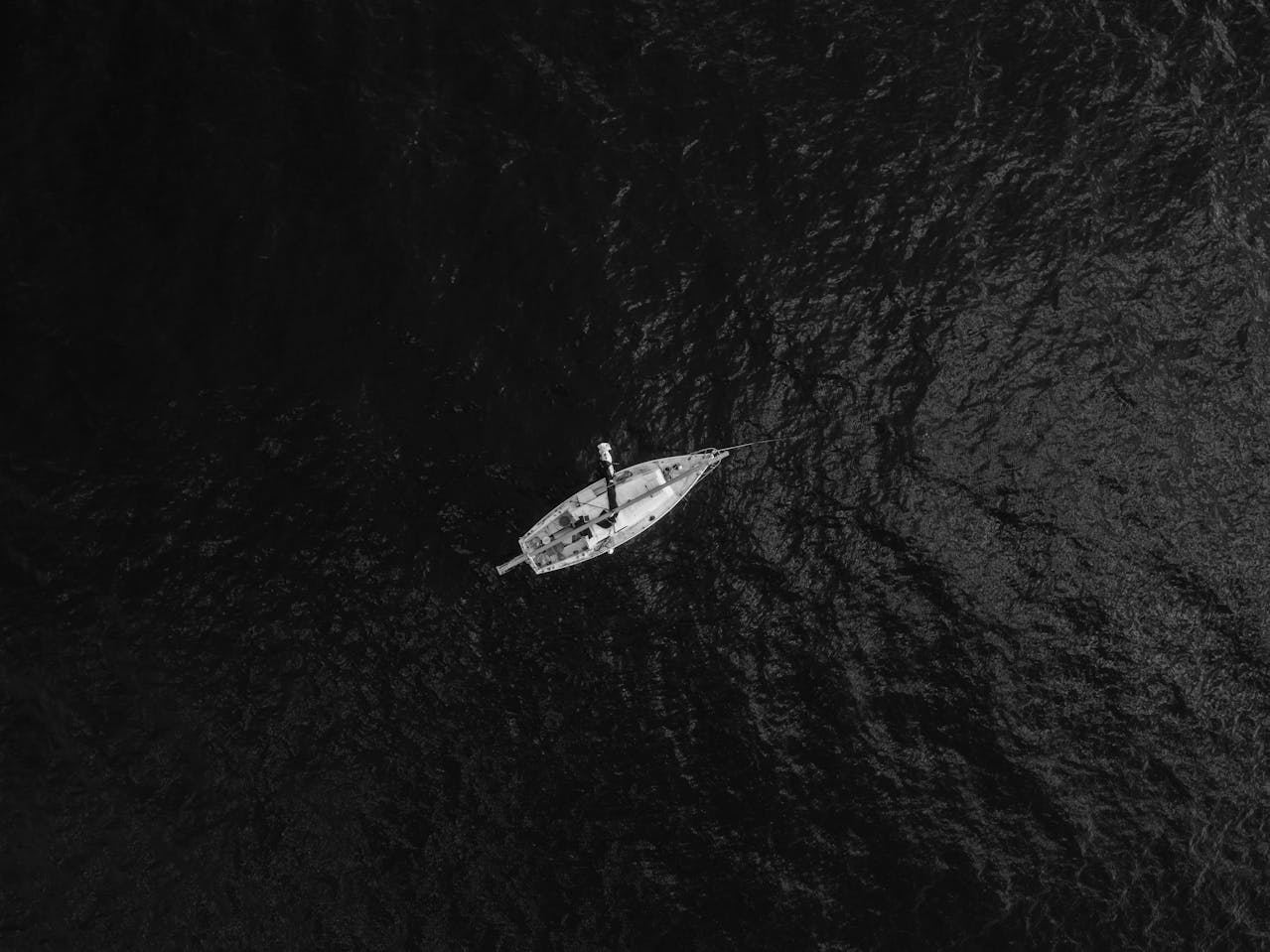
Meaning of Deep Sea Dreams: Complete Interpretation and Meaning
Dreams about the deep sea are sleep experiences that many people often have. The deep sea in dreams is usually depicted as vast, dark, and mysterious waters with depths that are difficult to reach. This dream can involve various scenarios such as swimming, diving, drowning, or simply gazing at the deep sea from a distance. In this article, we will thoroughly explore the meaning and interpretation of deep sea dreams from various perspectives.
1. Definition of Deep Sea Dreams

sea (credit: pexels.com)
Deep sea dreams can be defined as sleep experiences in which a person sees, feels, or interacts with the very deep ocean in their dreams. The deep sea in these dreams usually has the following characteristics:
- Vast and boundless waters
- Dark water colors, usually deep blue or pitch black
- Depths that are difficult to measure or unreachable
- A mysterious and somewhat frightening atmosphere
- Chilling silence beneath the water's surface
In the context of primbon and traditional dream interpretation, the deep sea is often regarded as a symbol of the subconscious, repressed emotions, or the mysteries of life that remain unsolved. The depths of the sea symbolize the hidden aspects of the human mind and soul that have not yet been fully understood or explored.
Dreams about the deep sea can evoke a range of feelings in the dreamer, from awe and curiosity to anxiety and fear. These emotional reactions often serve as key elements in interpreting the dream's meaning for the dreamer's real life.
2. General Meaning of Deep Sea Dreams
In general, dreams about the deep sea have several meanings that are often associated with them:
- Self-exploration: The deep sea can symbolize hidden aspects of personality or life experiences that have not been fully explored. This dream may indicate a desire or need to dive deeper into oneself.
- Deep emotions: The depths of the sea are often associated with deep emotions, whether they are positive or negative feelings. Dreams of the deep sea can reflect strong emotions that are being experienced or suppressed in daily life.
- Uncertainty and mystery: The dark and unreachable deep sea can represent uncertainty or mysteries in life that remain unsolved. This could relate to an uncertain future or aspects of life that are still not understood.
- Potential and possibilities: The vastness of the deep sea can also symbolize unlimited potential and new possibilities in life. This dream may indicate opportunities or potential that have yet to be explored within oneself.
- Fear and anxiety: For some, the deep sea can evoke a fear of the unknown or uncontrollable situations. This dream may reflect anxieties or fears that are being faced in real life.
- Spiritual and transcendental: In some traditions, the deep sea is considered a symbol of the spiritual realm or transcendental experiences. Dreams about the deep sea may indicate a spiritual journey or a search for deeper meaning in life.
It is important to remember that the specific meaning of dreams about the deep sea can vary depending on the context of the dream, the dreamer's feelings, and other details that appear in the dream.
Therefore, accurate interpretation often requires deeper and more personal analysis.
3. Interpretation of Deep Sea Dreams According to Primbon
In Javanese primbon tradition, dreams about the deep sea have several interpretations believed to provide insights into the dreamer's life. Here are some common interpretations according to primbon:
- Seeing a calm and deep sea: This is considered a good sign, indicating inner peace and satisfaction in life. Primbon interprets that the dreamer has reached a point where they feel content with their achievements and have good emotional stability.
- Swimming in the deep sea: This interpretation signifies that the dreamer is in the process of exploring their potential. It could mean that there will be new opportunities in their career or personal life that allow for self-development.
- Sinking in the deep sea: Although it sounds frightening, primbon often interprets this as a process of transformation. The dreamer may be facing significant challenges in their life, but they will emerge as a stronger and wiser individual.
- Seeing big waves in the deep sea: This is interpreted as a warning of significant changes to come. Primbon suggests that the dreamer prepare to face challenges and changes in the near future.
- Seeing treasure at the bottom of the deep sea: This interpretation is very positive, indicating that the dreamer will discover "treasure" in their life, whether it be in the form of financial success, the discovery of hidden talents, or spiritual enlightenment.
It is important to note that these primbon interpretations should not be taken as definite predictions, but rather as guides for self-reflection and introspection. Each individual may have different experiences and life contexts, so the meaning of dreams can vary.
4. Psychological Perspective on Deep Sea Dreams

sea (credit: pexels.com)
From a psychological perspective, dreams about the deep sea are often considered a representation of the human subconscious. Some psychological perspectives on this dream include:
- Freudian Theory: Sigmund Freud might interpret the deep sea as a symbol of the vast and deep subconscious. This dream could indicate the presence of repressed desires or conflicts that need to be acknowledged and addressed.
- Jungian Psychology: Carl Jung might see the deep sea as a representation of the "collective unconscious" - a repository of shared experiences and knowledge of humanity. This dream could be seen as a call to explore hidden aspects of the psyche.
- Gestalt Psychology: This approach would focus on the feelings and emotions that arise during the dream. For example, feelings of fear while in the deep sea may reflect anxiety about uncontrollable situations in real life.
- Information Processing Theory: This perspective views dreams as a way for the brain to process and integrate information. Dreams of the deep sea may reflect the mind's efforts to understand and organize complex experiences or information.
- Humanistic Psychology: This approach may interpret dreams of the deep sea as a metaphor for unrealized potential for growth and self-actualization.
Modern psychologists generally agree that dream interpretation should be conducted with consideration of the dreamer's personal context. Factors such as life experiences, current emotional state, and personal associations with the sea can significantly influence the meaning of the dream.
In psychotherapy practice, dreams about the deep sea can be a valuable starting point for exploring the feelings, fears, and aspirations of clients that may not yet be fully realized. The therapist may invite the client to reflect on what the deep sea represents for them personally, and how they feel about the various elements in that dream.
5. Symbolism of the Deep Sea in Dreams
The deep sea as a symbol in dreams has a variety of rich and profound meanings. Here are some aspects of deep sea symbolism that often appear in dream interpretations:
- Unconsciousness: The deep sea is often seen as a representation of the human subconscious. Its depth and darkness symbolize aspects of the self that have not yet been fully understood or explored.
- Emotions: The deep sea can represent the depth of human emotions. The waves on the surface might symbolize more visible emotions, while the undercurrents represent deeper and hidden feelings.
- Mystery and uncertainty: The immeasurable depths of the sea are often associated with the mysteries of life and the uncertainties of the future. This can represent aspects of life that are unknown or not understood.
- Transformation: The deep sea can also symbolize the process of transformation and change. Diving into the sea can represent the desire to change oneself or to face personal challenges.
- Natural power: The vast and deep sea reminds us of the great and uncontrollable forces of nature. This can symbolize forces beyond human control in life.
- Spiritual: In many spiritual traditions, the deep sea is considered a symbol of the spiritual realm or transcendental experiences. This can represent a deeper search for the meaning of life.
- Potential and possibilities: The vastness of the deep sea can also symbolize unlimited potential and new possibilities in life. This can represent unexplored opportunities.
- Fear and anxiety: For some people, the deep sea can evoke a fear of the unknown or uncontrollable situations in life.
It is important to remember that this symbolism can vary depending on the cultural context and personal experiences of the dreamer. In interpreting dreams, it is essential to consider not only universal symbolism but also personal associations and feelings towards the deep sea.
6. Types of Deep Sea Dreams and Their Meanings
Dreams about the deep sea can appear in various forms and scenarios. Here are some common types of deep sea dreams along with their general interpretations:
- Swimming in the deep sea:
- Meaning: Exploring deep emotions or aspects of oneself
- Interpretation: Readiness to face emotional or personal challenges
- Sinking in the deep sea:
- Meaning: Feeling overwhelmed by emotions or life situations
- Interpretation: The need for help or change in facing problems
- Seeing sea monsters:
- Meaning: Hidden fears or anxieties
- Interpretation: The presence of issues or fears that need to be confronted
- Finding treasure at the bottom of the sea:
- Meaning: Discovering hidden potential or talents
- Interpretation: There will be significant opportunities or achievements in the future
- Sailing over the deep sea:
- Meaning: Life journey or self-exploration
- Interpretation: Readiness to face changes or new adventures
- Being caught in a storm in the deep sea:
- Meaning: Facing difficulties or emotional conflicts
- Interpretation: The need for resilience and strategies in dealing with problems
- Seeing light at the bottom of the deep sea:
- Meaning: Hope or enlightenment amidst difficulties
- Interpretation: There will be new solutions or understandings in the issues faced
- Flying over the deep sea:
- Meaning: Freedom from emotional limitations
- Interpretation: The ability to overcome problems with a new perspective
Each type of dream can have different nuances and details that can influence its interpretation. It is important to consider the feelings and personal context of the dreamer in interpreting the specific meanings of these dreams.
7. Hidden Messages Behind Deep Sea Dreams

sea (credit: pexels.com)
Dreams about the deep sea often carry hidden messages that can provide valuable insights into the dreamer's psychological and emotional state. Here are some messages that may be hidden behind deep sea dreams:
- The need for introspection: The deep sea can symbolize an invitation to look deeper within oneself, exploring thoughts and feelings that may have long been ignored.
- A call for change: This dream could be a sign that the dreamer is ready for significant changes in their life, whether in career, relationships, or other personal aspects.
- A warning about repressed emotions: The deep sea may represent unacknowledged or unaddressed emotions. This dream might indicate the need to confront and manage those emotions.
- Indication of untapped potential: The depth of the sea can symbolize hidden potential and talents that have not been fully explored or utilized.
- A warning of risks: In some cases, dreams about a frightening deep sea can serve as a warning about risks or dangers that may be unrecognized in real life.
- The need for balance: A calm sea might indicate the need for balance in life, while a turbulent sea may suggest imbalances that need to be addressed.
- A push for spiritual exploration: For some, deep sea dreams can be a call for spiritual exploration or a deeper search for the meaning of life.
- Reflection on relationships: The deep sea can symbolize the depth of relationships. This dream may invite reflection on the quality and dynamics of important relationships in one’s life.
Understanding these hidden messages requires deep reflection and honesty with oneself. Often, the messages carried by deep sea dreams are personal and unique to each individual, depending on life experiences, current emotional states, and other personal contexts.
8. Tips for Interpreting Deep Sea Dreams
Interpreting dreams, especially complex ones like dreams about the deep sea, requires a careful and reflective approach. Here are some tips to help you interpret deep sea dreams:
- Note the details of the dream:
- Immediately after waking up, write down all the details you remember about the dream
- Pay attention to the color of the water, the weather, and other elements that appeared in the dream
- Reflect on your feelings:
- Recall how you felt during the dream
- Also note how you feel upon waking and remembering the dream
- Connect with real life:
- Think about whether there are situations or emotions in your current life that are similar to what you experienced in the dream
- Consider whether this dream may be a reflection of your worries or hopes
- Analyze the symbolism:
- Think about what the deep sea means to you personally
- Consider the universal symbolism of the elements in your dream
- Don’t fixate on one interpretation:
- Remember that dreams can have many layers of meaning
- Be open to various possible interpretations
- Consult with trusted sources:
- Read literature on dream interpretation from various perspectives
- If necessary, consult with a psychologist or therapist experienced in dream analysis
- Pay attention to patterns:
- If similar dreams occur frequently, note the patterns and changes
- Observe if there is a connection between recurring dreams and situations in your life
- Use your intuition:
- Sometimes, the most accurate interpretation is the one that feels most resonant with yourself
- Trust your intuition in making sense of the dream
Remember that dream interpretation is a very personal process. There is no absolute right or wrong interpretation. What matters most is how the interpretation can help you understand yourself and your life situation better.
9. Benefits of Understanding the Meaning of Deep Sea Dreams
Understanding the meaning of deep sea dreams can provide various benefits for mental health and personal development. Here are some of the main benefits of understanding these dreams:
- Increased self-awareness:
- Helps identify hidden emotions and thoughts
- Enhances understanding of subconscious motivations and desires
- A tool for problem-solving:
- Dreams can provide new perspectives on problems faced
- Helps find creative solutions that may not be thought of while awake
- Stress management:
- Understanding dreams can help identify sources of stress
- Provides insights on how to manage anxiety and fears
- Creativity development:
- Deep sea dreams are often rich in symbolism and metaphor
- Interpreting dreams can stimulate creative and imaginative thinking
- Increased emotional intelligence:
- Helps in understanding and managing emotions better
- Enhances empathy and understanding of others' feelings
- Spiritual growth:
- For some, deep sea dreams can be a means of spiritual exploration
- Helps in the search for deeper meaning in life
- Improved sleep quality:
- Understanding dreams can reduce sleep-related anxiety
- Helps create a more positive relationship with the sleep experience
- A tool for introspection:
- Encourages deeper self-reflection
- Assists in the process of self-evaluation and personal goal setting
- Improved relationships:
- Understanding dreams can provide insights into relationship dynamics
- Helps in resolving conflicts and improving communication
- Intuition development:
- Trains the ability to listen to and trust intuition
- Enhances the connection between conscious and subconscious mind
By understanding the meaning of deep sea dreams, one can gain valuable insights about oneself and the world around them. This process can be a powerful tool for personal growth, problem-solving, and overall mental well-being enhancement.
10. Dream Interpretation Traditions in Javanese Culture

sea (credit: pexels.com)
In Javanese culture, the interpretation of dreams holds a special place and has been an integral part of daily life for centuries. This tradition is known as "ngelmu titen" or the science of observation, which includes dream interpretation as one of its aspects. Here are some important elements in the Javanese dream interpretation tradition:
- Primbon as a guide:
- Primbon is an ancient book containing various traditional Javanese knowledge, including dream interpretations
- Many Javanese families have a primbon that has been passed down through generations
- The role of elders or wise people:
- In traditional Javanese society, elders or those considered wise are often consulted for dream interpretations
- They are believed to possess knowledge and experience in understanding spiritual messages
- Connection to the spiritual realm:
- Dreams are considered a bridge between the real world and the spiritual realm
- Some dreams are believed to be messages from ancestors or spiritual entities
- The concept of "wangsit":
- Wangsit is a kind of guidance or inspiration received through dreams
- Dreams considered as wangsit are usually given special attention
- Rituals and ceremonies related to dreams:
- There are several rituals performed to seek guidance through dreams, such as "laku tapa" or meditation
- Some Javanese people also perform certain rituals before sleeping to obtain meaningful dreams
- Emphasis on symbolism:
- Javanese dream interpretation places a strong emphasis on symbolism and metaphor
- Objects, colors, and situations in dreams are considered to have their own meanings
- Connection to the life cycle:
- Dreams are often associated with important stages in life such as birth, marriage, and death
- Some dreams are considered omens of significant events to come
- Influence of Islam:
- With the arrival of Islam in Java, some aspects of dream interpretation have also been influenced by Islamic teachings
- For example, dreaming of meeting the Prophet Muhammad SAW is considered a very special dream
- Flexibility of interpretation:
- Although there are guidelines in primbon, dream interpretation in Javanese culture tends to be flexible
- The personal context and situation of the dreamer are always considered in the interpretation
- Integration with daily life:
- The results of dream interpretations are often used as considerations in daily decision-making
- Some Javanese still rely on guidance from dreams for important matters in their lives
The tradition of dream interpretation in Javanese culture reflects the spiritual and philosophical richness of the Javanese people. Although modernization has brought changes in how Javanese people view dreams, many aspects of this tradition still endure and continue to influence daily life. It is important to understand that this tradition is not just about predicting the future, but also about self-introspection, seeking wisdom, and connecting oneself with the broader universe.
11. 5W 1H of Deep Sea Dreams
To understand deep sea dreams more comprehensively, we can analyze them using the 5W1H method (What, Who, When, Where, Why, How). This approach helps us explore various aspects of the dream experience:
What
A deep sea dream is a sleep experience where someone sees, feels, or interacts with a very deep ocean. This can involve various scenarios such as swimming, diving, sinking, or simply gazing at the sea from a distance. The deep sea in this dream is usually depicted as vast, dark, and mysterious waters with depths that are hard to reach.
Elements that often appear in deep sea dreams include:
- Dark blue or black seawater
- Huge waves or strong currents
- Mysterious sea creatures
- Ships or boats
- Remote islands
- Storms or extreme weather
- Treasure or ancient artifacts at the bottom of the sea
Who
Deep sea dreams can be experienced by anyone, regardless of age, gender, or cultural background. However, some groups may be more prone to experiencing these dreams:
- People living near the sea or having a strong connection with the ocean
- Individuals facing major changes or uncertainties in life
- Those with an interest or fear of the sea
- Those in a process of self-exploration or spiritual searching
- Individuals experiencing high stress or anxiety
In the dream, the dreamer may be the main protagonist or merely an observer. Sometimes, important figures in the dreamer's life also appear in the dream, such as family members, friends, or even mythological figures related to the sea.
When
Deep sea dreams can occur at any time during sleep, but they often happen during the REM (Rapid Eye Movement) phase of sleep, which is the phase where the most vivid and memorable dreams occur. Some factors that may influence the timing of these dreams include:
- After watching a movie or reading a book about the sea
- Before or after a trip to the beach or ocean
- During periods of stress or major life changes
- When experiencing deep emotional issues
- During certain phases in the life cycle, such as career or relationship transitions
Some people also report experiencing deep sea dreams repeatedly at certain times in their lives, which may indicate unresolved issues or themes.
Where
Although dreams occur in the dreamer's mind, the setting or location in deep sea dreams can vary and have its own significance:
- Open sea: May symbolize freedom or uncertainty
- Beach: Could represent the boundary between the conscious and subconscious
- Seafloor: Often associated with hidden aspects of the mind or emotions
- Ship or boat: Could symbolize the journey of life or ways of facing challenges
- Remote island: May represent isolation or difficult-to-reach goals
- Underwater cave: Could symbolize hidden aspects of the self or forgotten memories
Specific locations in the dream may have personal meanings for the dreamer, depending on their experiences and associations with those places.
Why
There are various reasons why someone might experience dreams about the deep sea:
- Emotional reflection: These dreams can be a way for the mind to process deep or complex emotions
- Anxiety or fear: The deep sea may represent fears of the unknown or uncontrollable situations
- Need for self-exploration: These dreams may reflect a desire to understand hidden aspects of oneself
- Transformation process: The deep sea may symbolize a process of change or personal growth that is ongoing
- Spiritual searching: For some, these dreams could be part of a spiritual journey or search for meaning in life
- External influences: Daily experiences, media consumed, or the surrounding environment can influence dream content
- Memory or trauma: Deep sea dreams may be a way for the brain to process past experiences or trauma related to water or the sea
How
The way deep sea dreams are experienced and processed by individuals can vary:
- Physical sensations: Some people report feeling wet, cold, or pressure from water in their dreams
- Emotions: These dreams can evoke a range of emotions, from awe and tranquility to fear and anxiety
- Narrative: The dream may have a clear storyline or just consist of a series of disjointed images and sensations
- Interaction: The dreamer may actively interact with the ocean environment or merely be a passive observer
- Level of awareness: Some people may experience lucid dreams, where they are aware that they are dreaming and can influence the course of the dream
- Memory: How clearly and in detail the dream is remembered upon waking can vary
- Interpretation: The way individuals interpret and respond to their dreams can greatly differ, depending on cultural background, beliefs, and personal experiences
Understanding deep sea dreams through this 5W+1H approach can help provide a more comprehensive perspective on the dream experience. This allows us to explore not only the content of dreams but also the personal and psychological context that may influence or be influenced by those dreams.
12. Comparison of Deep Sea Dream Interpretations
Interpretation of deep sea dreams can vary depending on the cultural, religious, and psychological perspectives used. Here is a comparison of deep sea dream interpretations from various viewpoints:
Javanese Primbon Interpretation
In Javanese tradition, deep sea dreams are often associated with spiritual aspects and predictions of the future:
- Calm sea: A sign of peace of mind and a stable life
- Wavy sea: A warning of upcoming challenges or significant changes
- Swimming in the deep sea: A symbol of struggle in achieving goals
- Seeing treasure at the bottom of the sea: A sign of incoming fortune or success
Psychological Perspective
Modern psychology, especially the psychoanalytic approach, interprets deep sea dreams as representations of the subconscious:
- Deep sea: Symbolizes a vast and complex subconscious
- Swimming or diving: The process of self-exploration and facing hidden aspects of personality
- Submerging: Could indicate feelings of being overwhelmed by emotions or life situations
- Seeing sea creatures: Representations of fears or unacknowledged potentials
Islamic Interpretation
From an Islamic perspective, deep sea dreams can have various meanings:
- Calm sea: May symbolize a peaceful heart and strong faith
- Wavy sea: Might indicate tests or trials in life
- Swimming in the sea: Can be interpreted as a struggle to live according to religious teachings
- Seeing fish in the deep sea: Often interpreted as a sign of fortune
Western Cultural Interpretation
In modern Western culture, the interpretation of deep sea dreams is often influenced by popular psychology and cultural symbolism:
- The sea as a symbol of freedom and adventure
- Submerging can be seen as a metaphor for feeling overwhelmed in daily life
- Finding treasure in the deep sea may symbolize the discovery of hidden self-potential
- Storms at sea can represent emotional conflicts or difficult periods in life
New Age Spiritual Perspective
The New Age spiritual movement often interprets deep sea dreams with a more holistic approach:
- The sea as a symbol of unity with the universe
- Swimming or diving viewed as a spiritual journey
- Encountering sea creatures can be interpreted as contact with spiritual entities or higher aspects of self
- Deep sea as a portal to other dimensions or alternative realities
Mythological Interpretation
Many ancient mythologies have specific interpretations regarding the sea and related dreams:
- Greek: The sea is often associated with the god Poseidon and represents uncontrollable natural forces
- Norse: The deep sea could symbolize Jörmungandr, the giant serpent that encircles the world
- Polynesian: The sea is seen as a source of life and wisdom
Scientific Approach
Modern scientific research on dreams tends to view deep sea dreams from neurobiological and cognitive function perspectives:
- Dreams as a result of brain activity during sleep
- Dream content may reflect information processing and memory consolidation
- Emotions in dreams are seen as ways the brain regulates mood and processes emotional experiences
This comparison shows that the interpretation of deep sea dreams varies greatly depending on cultural context, beliefs, and approaches used. Each perspective offers unique insights that can help individuals understand their dream experiences from different angles. It is important to remember that there are no absolutely right or wrong interpretations; what matters most is how those interpretations resonate with personal experiences and assist individuals in their self-understanding and personal growth.
13. Differences in Deep Sea Dream Interpretations

ocean (credit: pexels.com)
Although there are some similarities in the interpretation of deep sea dreams from various perspectives, there are also significant differences that need to be noted. Here are some key differences in the interpretation of deep sea dreams:
Focus of Interpretation
- Javanese Primbon: More focused on predictions of the future and spiritual guidance
- Psychology: Emphasizes the psychological and emotional aspects of the individual
- Religion: Often associates dreams with religious teachings and spiritual values
- Modern Western Culture: Tends to view dreams as a reflection of daily life and personal aspirations
- New Age: Emphasizes the spiritual and metaphysical aspects of dream experiences
Sources of Authority
- Javanese Primbon: Relies on ancient texts and traditional knowledge
- Psychology: Based on psychological theories and scientific research
- Religion: Refers to sacred texts and the teachings of religious leaders
- Modern Western Culture: Often influenced by popular media and popular psychology
- New Age: Combines various spiritual traditions and personal philosophies
Purpose of Interpretation
- Javanese Primbon: To gain guidance or warnings about the future
- Psychology: To understand the mental and emotional state of the individual
- Religion: To strengthen faith and provide moral guidance
- Modern Western Culture: For self-introspection and personal problem-solving
- New Age: For spiritual enlightenment and personal growth
Approach to Symbols
- Javanese Primbon: Symbols have fixed meanings passed down through generations
- Psychology: Symbols are seen as representations of the individual’s psychological condition
- Religion: Symbols are often associated with religious concepts
- Modern Western Culture: Symbols are interpreted more flexibly and personally
- New Age: Symbols are seen as messages from the universe or spiritual dimensions
Role of Personal Context
- Javanese Primbon: Personal context is less considered, placing more emphasis on universal meanings
- Psychology: Highly considers personal context and individual life experiences
- Religion: Personal context is considered within the framework of religious teachings
- Modern Western Culture: Places a strong emphasis on the personal relevance of dreams
- New Age: Combines personal context with universal spiritual concepts
View on Future Predictors
- Javanese Primbon: Dreams are considered capable of predicting future events
- Psychology: Dreams are not viewed as predictors, but rather reflections of current conditions
- Religion: Some traditions see dreams as divine guidance, while others are more cautious
- Modern Western Culture: Generally skeptical of dreams as future predictors
- New Age: Often views dreams as guidance for the future, but in a spiritual context
Approach to Creatures or Entities in Dreams
- Javanese Primbon: Creatures in dreams may be considered messages from ancestors or spiritual entities
- Psychology: Creatures are seen as representations of aspects of the self or others in the dreamer's life
- Religion: May be seen as angels, jinn, or other spiritual entities depending on religious teachings
- Modern Western Culture: Tends to view creatures as projections of personal thoughts or fears
- New Age: Creatures may be considered spiritual guides or manifestations of universal energy
Attitude towards Nightmares
- Javanese Primbon: Nightmares may be considered warnings or bad omens
- Psychology: Nightmares are viewed as the brain's way of processing fear or trauma
- Religion: May be seen as tests of faith or moral warnings
- Modern Western Culture: Often viewed as manifestations of daily stress or anxiety
- New Age: May be seen as opportunities for spiritual growth and overcoming fears
These differences indicate that the interpretation of deep sea dreams is greatly influenced by cultural background, beliefs, and the philosophical approaches used. There is no single approach that can be considered more correct or valid than others. Each perspective offers unique insights that can help individuals understand their dream experiences from different viewpoints. What is most important is how these interpretations can assist individuals in the process of self-understanding, personal growth, and enhancing their quality of life.
14. FAQ About Deep Ocean Dreams
Here are some frequently asked questions about deep sea dreams along with their answers:
1. Do deep sea dreams always have special meanings?
Not always. While many traditions and psychological approaches attribute special meanings to deep sea dreams, it is important to remember that not all dreams need to have a profound significance. Sometimes, dreams are simply the result of the brain processing information and daily experiences. However, if the dream feels significant or recurring, it may be beneficial to reflect on its meaning for you personally.
2. How can one distinguish between a regular dream and a dream that has important meaning?
Some indicators that can help distinguish a regular dream from one that may have deeper meaning:
- Emotional intensity: Dreams that evoke strong emotions are often considered more significant.
- Clarity and detail: Dreams that are very clear and detailed may be more important to pay attention to.
- Frequency: Recurring dreams may reflect unresolved issues or themes.
- Impact after waking: If a dream continues to influence your feelings or thoughts after waking, there may be meaning worth exploring.
3. Does dreaming of drowning in the deep sea always mean something bad?
Not always. Although drowning dreams can be frightening, their interpretations can vary:
- In psychology, drowning can symbolize feeling overwhelmed by emotions or life situations.
- Some spiritual traditions view drowning as a symbol of transformation or rebirth.
- In a personal context, drowning dreams may reflect a need to "let go" of something in your life.
4. Can deep sea dreams predict the future?
This is a controversial question. Some cultural and spiritual traditions believe that dreams can provide insights into the future. However, from a scientific perspective, there is no conclusive evidence that dreams can accurately predict the future. Dreams are more often seen as reflections of current thoughts, feelings, and experiences, which may influence our perceptions and decisions about the future.
5. Is there a way to invite deep sea dreams?
Although there is no sure method to invite specific dreams, some techniques may help:
- Meditate or visualize about the sea before sleeping.
- Read or watch content about the sea before sleeping.
- Practice dream "incubation" techniques, where you focus on the intention to dream about the deep sea before sleeping.
- Keep a dream journal to enhance awareness and memory of your dreams.
6. How to cope with nightmares about the deep sea?
If you frequently experience nightmares about the deep sea:
- Practice relaxation techniques before sleeping.
- Try to understand the source of your fear of the sea or deep water.
- If the dreams are very disturbing, consider talking to a therapist or counselor.
- Try "lucid dreaming" techniques where you learn to recognize that you are dreaming and change the course of the dream.
7. What does a dream about the deep sea mean differently for each person?
Yes, dream interpretation can be very personal. Although there are universal symbols, a person's life experiences, emotions, and personal associations with the sea will influence the meaning of the dream for them. What is frightening for one person may be enjoyable for another. Therefore, it is important to consider your personal context when interpreting a dream.
8. What is the best way to remember deep sea dreams?
Here are some tips to improve dream recall:
- Keep a notebook and pen by your bedside.
- Write down your dreams as soon as you wake up, even if it’s just fragments.
- Stay lying down with your eyes closed for a moment after waking to help remember details.
- Avoid using alarms that are too loud, as they can disrupt the dream recall process.
- Maintain a consistent sleep routine.
9. Do deep sea dreams have different meanings in different cultures?
Yes, the interpretation of deep sea dreams can vary greatly across cultures:
- In some maritime cultures, the sea is seen as a source of life and wisdom.
- Cultures that are unfamiliar with the sea may view it as a symbol of uncertainty or danger.
- Some spiritual traditions see the sea as a symbol of the subconscious or spiritual world.
- In the mythology of various cultures, the sea is often associated with certain deities or supernatural forces.
10. Can deep sea dreams help in problem-solving?
Many people believe that dreams, including deep sea dreams, can assist in problem-solving:
- Dreams can provide a new perspective on the problems being faced.
- The symbolism in dreams may help reveal aspects of a situation that have not been realized.
- The process of reflecting on dreams can spark creative ideas for overcoming challenges.
- Some people report gaining "insights" or solutions in their dreams.
It is important to remember that while dreams can be a useful tool for introspection and self-understanding, they should not be relied upon as the sole source of guidance in making important decisions. Always use rational judgment and, if necessary, seek professional advice for serious issues in your life.
15. Conclusion
Dreams about the deep ocean are experiences rich in meaning and symbolism. From the perspective of Javanese primbon to modern psychological views, the interpretation of these dreams reflects the complexities of human thoughts and emotions. The deep ocean is often seen as a representation of the subconscious, deep emotions, or spiritual journeys.
It is important to understand that dream interpretations are highly personal and can vary depending on cultural context, life experiences, and individual emotional states. There is no absolute right or wrong interpretation. What matters most is how the understanding of these dreams can assist us in the process of introspection, personal growth, and improving the quality of our lives.
In facing deep ocean dreams, we are invited to reflect on various aspects of our lives - from fears and anxieties to hopes and untapped potential. These dreams can serve as a mirror reflecting our inner state, providing insights into the challenges we face, and perhaps even offering clues about the steps we need to take on our life journey.
(kpl/dhm)
Disclaimer: This translation from Bahasa Indonesia to English has been generated by Artificial Intelligence.






